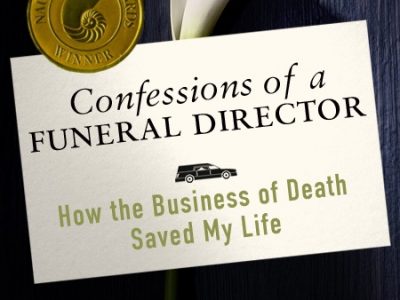Should Children Go to Funerals?

I joined a forum at HuffPost Live the other day. They called me a couple hours before the forum started to see if I’d be willing to add my funeral director’s perspective. I was not entirely prepared (which was evident in the final question they asked me towards the end of the convo).
Otherwise, it was a great conversation and an honor to be included with other respectable persons in their fields. The article we are discussing is “Letting Children Share in Grief” from the New York Times.
Death Perspectives: Funeral Director and Atheist
 Today I’d like to start a series of irregular guest posts called “Death Perspectives”, where people from different religious and non-religious perspectives share how they understand death as informed by their religion. And I’m happy that my first guest post is from a fellow funeral director, Heather Hernandez.
Today I’d like to start a series of irregular guest posts called “Death Perspectives”, where people from different religious and non-religious perspectives share how they understand death as informed by their religion. And I’m happy that my first guest post is from a fellow funeral director, Heather Hernandez.
After you read her post, ask her questions about how her perspective informs her views of dying, death and funerals. She’s very eloquent and can help you understand how an Atheist views death.
*****
It is a quiet moment, the one during a funeral service or a rosary or a mass. Someone – priest, preacher, family member – has asked us to bow our heads in prayer. I interlace my fingers, hands clasped in front of me. As I listen to the silence of people around me as they focus on their commune with God, I take the moment for a deep breath and a concentrated effort for the purity of blank meditation. My eyes are open, and I scan the room from the back corner. I’m not communicating with anyone but my own inner monologue. I hear the echo of “amen” as the prayer concludes, but not from my own throat.
I am an atheist.
I am a funeral director.
It is a unique thing to be a person without faith working in an industry where faith is often a driving force for what we do. Our funeral rites and rituals have a basis in religion more often than not, and I interact with people from all walks of religion on a daily basis. I appreciate that my families have beliefs to give them solace, faith to warm their hearts and dull the sharp sting of grief to an ache.
I am not usually an evangelical atheist. I would never dream of stepping outside of my role as a funeral director to criticize someone else’s rituals or step on their hopes of an afterlife. Lately, I only feel the need to speak up about my beliefs because non-believers are often painted in a negative light, as amoral and non-contributive to society and our communities. I look at myself and I don’t see that.
I am a military wife supporting a husband about to deploy to Afghanistan.
I am an animal-lover who stopped four lanes of traffic to rescue two terrified stray dogs.
I am a volunteer at my local library, teaching adults how to read.
The way that I choose to live is directly affected by my atheism. It’s hard for me to look at my husband, my parents, my sisters and my best friends and realize that in my reality there is no afterlife. There’s no light at the end of the tunnel or Heaven where we meet up and spend the rest of eternity in each others’ company.
What I do get is the realization that the here and now is all I get. I have to enjoy every single second that I get here, every breath I take, every opportunity to reach out and hold my husband’s hand or call my parents and tell them I love them. I don’t believe that I get a do-over or forgiveness to wipe the slate clean, and I am therefore my own harshest critic. I want to be remembered as someone who always did the right thing the right way, who served others and loved as hard as she could.
I am an atheist, but sometimes, even though I’m not thanking God, I take that quick moment of silence during the Lord’s Prayer to reflect and appreciate how grateful I am for the time I do have and all the wonderful ways I can spend it.
*****
Heather Hernandez is a mid-20s graduate of mortuary college, navigating the complexities of death care as a first generation funeral director. When she’s not running services, she’s also a wife, a dog-lover, and an amateur taxidermist. You can read her blog at http://mortuaryreport.com/ or check out her taxidermied mice and other artwork at http://www.etsy.com/shop/mortuaryreport.
5 Cultural Attitudes Toward Death
The following are large-scale cultural attitudes towards death.
These are taken verbatim from “Death and Dying, Life and Living”:
1. Tame Death: Death is familiar and simple; thatis, it is regarded as inevitable and not attempt is made to evade it. Persons who are dying typically calmly await their deaths, usually surrounded by loved ones and members of the community, all of whom wait peacefully for the end. In other words, death is a public event. A major focus of attention is the community; it is deeply affected by the loss of one of its necessary participants. Death is also seen as a sort of sleep; either one is awakened at some point to eternal bliss, or one remains eternally asleep.
2. Death of the self: The focus of attention is on the one who dies. Death produces great anxiety in that person because it is believed that one is either rewarded or punished in his or her future state. Death of the self involves a final testing period, and what one does at this moment determines what will happen to one after death (and indeed the meaning of one’s whole life). Several religious traditions have some such belief. For instance, some Jews believe that it is important at the moment of death to recite the Shema. Muslims are taught that invoking the Divine Name at the moment of death can be salvific. And some Buddhists hold that chanting the name of Amitabha Buddha at this point in one’s life will ensure that one will end up in the Pure Land after death. In the West, this attitude once led to the development of a formal ares moriendi, an art of dying well.

3. Remote and Imminent death: One’s attitude toward death is basically highly ambivalent. Death is viewed as a wholly natural event (not a supernatural one), but still great effort is made to keep it at a distance. It is both natural and dangerous, inviting and repelling, beautiful and to be feared.
4. Death of the other: Here, the main focus of attention is on the survivors. Death primarily involves the breaking of relationships. For survivors, it results in an intolerable separation from the one who dies. Feelings and behaviors may go nearly out of control (wailing, keening, throwing oneself in the grave, etc.). For the one who dies, death is primarily a period of waiting to be rejoined with loved ones in some other state.
5. Death denied / forbidden death: Death is seen as being dirty or indecent (even “pornographic). Thus, it is offensive to die in public. Dying persons are therefore more or less isolated from the rest of the community. The very fact that the person is dying is denied, both to that person and to those around her or him. Emotions, both before and after the death are to be kept hidden, and huts mourning may be seen as morbid or even pathological. (Pages 55 -56)
Here’s three questions:
Which attitude most describes your personal attitude towards death?
Which attitude are you least familiar with?
Which attitude do you think best describes the West?
Cell Phone Karma
There’s always “that guy” who doesn’t silence his cell phone at a funeral. I kid you not, but half of the people who don’t silence their cell phones at funerals actually answer the call if it rings. I wish I was making this up. They answer their phone, they usually say something to the effect of, “I’m at a funeral … I’ll call you back later” and then they hang up and continue in their posture of mourning as if nobody heard them.
I was rather pleased with I saw this video. And although the cell phone karma in this video is slightly harsh, I secretly wish such funeral karma really existed.

